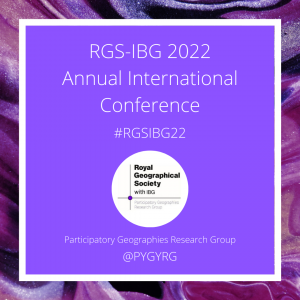CfP RGS-IBG 2022: Participatory methods for recovery and transformation

Sponsorship: Participatory Geographies Research Group (PYGYRG) (confirmed)
Format: hybrid (in-person and online), 2 slots (papers session with multiple 15 minute presentations + questions/discussant, followed by a participant-led roundtable discussion)
Convenors: Caitlin Hafferty (Countryside and Community Research Institute, University of Gloucestershire) and Bruna Montuori (School of Architecture, Royal College of Art)
If you would like to take part in the papers presentation, please submit a title and abstract (up to 250 words) to Caitlin Hafferty (caitlinhafferty@connect.glos.ac.uk) and Bruna Montuori (bruna.montuori@network.rca.ac.uk) by Monday 21st March (extended from 16th March). Please also get in touch if you have an interest in the session theme and are interested in helping to run the roundtable discussion, or have a suggestion for an alternative format.
Participatory processes and methods are increasingly sought after and embedded in research, policy, and practice, from local to international scales. This session aims to explore the ways in which participatory research works with communities and other key stakeholders to tackle complex issues and promote more sustainable, inclusive, and equitable outcomes. In particular, we are interested in how different tools, methods, and approaches can help us to recover, repair and rebuild in times of crisis, disruption, and change. For example, the role and importance of participation for climate change, food security, digital transitions, human rights, justice, public health, and development. We enquire what new research experiences emerge from different forms of enacting participatory approaches to meet the complex issues that have been explored in contemporary geography and related fields.
Taking inspiration from the 2021 RGS-IBG PYGYRG Contemporary Issues in Participatory Geography online event, we aim to bring together cutting-edge knowledge and practice in participatory research, transcending disciplinary boundaries and embracing diverse perspectives from within and beyond academia. This work includes, but is not limited to:
- Creative and innovative participatory methods for engaging with diverse groups and individuals, including different forms of mapping and GIS, walking, focus groups, photovoice, video, art, and performance (e.g. Brown et al., 2020; Kindon et al., 2007).
- The challenges and opportunities for online participatory methods, including reflections on ‘lessons learnt’ during the COVID-19 pandemic (e.g. Hall et al., 2021; Willis et al., 2022).
- Debates on ethics, scholar activism, positionality and reflexivity, and participatory approaches engaging with feminist, critical race, decolonial and postcolonial theories (Rose 1997, Derickson and Routledge, 2014, Askins, 2018, Nagar and Geiger, 2007).
- New and emerging approaches to participation in science, technology, policy, and deliberative democracy (e.g. Chilvers and Kearns, 2020).
- Considerations for institutionalising participation, facilitating organisational learning processes, and navigating organisational constraints (e.g. Escobar, 2021; Pallett, 2017).
Contributions are welcome from a wide range of academic, policy, practitioner, and community perspectives. Research which draws from multiple disciplines and forms of knowledge is particularly relevant. We warmly encourage postgraduate and early career researchers at any stage to submit new, emerging, and work-in-progress research. This session aims to offer a supportive space for knowledge sharing, discussion, reflection, and collaboration. We plan to run a split session with an initial paper presentation session (which can be either in-person or online depending on the availability of presenters), followed by a participant-led roundtable discussion supported by facilitators to explore these themes in more depth.
If you would like to take part in the papers presentation, please submit a title and abstract (up to 250 words) to Caitlin Hafferty (caitlinhafferty@connect.glos.ac.uk) and Bruna Montuori (bruna.montuori@network.rca.ac.uk) by Monday 21st March (extended from 16th March). Please take inspiration from, but do not feel limited by, the themes discussed above. Please also get in touch with Caitlin and Bruna if you have an interest in the session theme and are interested in helping to run the roundtable discussion, or have a suggestion for an alternative format.
Sustainability, inclusivity & safety statement: We welcome and support the Chair’s Statement on Inclusivity and Safety at the conference. We intend to make this a hybrid session to allow for wider participation both in-person and remotely. We would love to hear from anyone interested in the theme of this session from anywhere in the world, including practitioners, NGOs, policy, activists, teachers, communities, and other groups and individuals as co-producers of knowledge in participatory research. We are happy to help coordinate applications for guest passes to the conference, which will be granted at the discretion of the sponsoring research group (email pygyrgeo@gmail.com with any questions). Presentations may be delivered in a traditional format or take more creative forms.
References
Askins, K., 2018. Feminist geographies and participatory action research: co-producing narratives with people and place. Gender, Place & Culture, 25(9), pp.1277-1294.
Brown, G., Reed, P. and Raymond, C. M. (2020) ‘Mapping place values: 10 lessons from two decades of public participation GIS empirical research’, Applied Geography, 116, p. 102156. doi: 10.1016/j.apgeog.2020.102156.
Chilvers, J. and Kearnes, M. (2020) Remaking Participation in Science and Democracy, Science Technology and Human Values. doi: 10.1177/0162243919850885.
Escobar, O. (2021) ‘Between radical aspirations and pragmatic challenges: Institutionalizing participatory governance in Scotland’, Critical Policy Studies. Routledge, 00(00), pp. 1–16. doi: 10.1080/19460171.2021.1993290.
Hall, J., Gaved, M. and Sargent, J. (2021) ‘Participatory Research Approaches in Times of Covid-19: A Narrative Literature Review’, International Journal of Qualitative Methods, 20, pp. 1–15. doi: 10.1177/16094069211010087.
Kindon S, Pain R and Kesby M (eds) (2007) Participatory Action Research Approaches and Methods: Connecting people, participation and place. London: Routledge.
Nagar R, Geiger S, 2007, “Reflexivity and positionality in feminist fieldwork revisited” in Politics and Practice in Economic Geography (Sage, London) pp 267–278
Pallett, H. (2018) ‘Situating organisational learning and public participation: Stories, spaces and connections’, Transactions of the Institute of British Geographers, 43(2), pp. 215–229. doi: 10.1111/tran.12214.
Rose, G., 1997. Situating knowledges: positionality, reflexivities and other tactics. Progress in human geography, 21(3), pp.305-320
Routledge, P. and Derickson, K.D., 2015. Situated solidarities and the practice of scholar-activism. Environment and Planning D: Society and Space, 33(3), pp.391-407.
Willis, R. et al. (2021) ‘Taking deliberative research online: Lessons from four case studies’, Qualitative Research, p. 146879412110634. doi: 10.1177/14687941211063483.